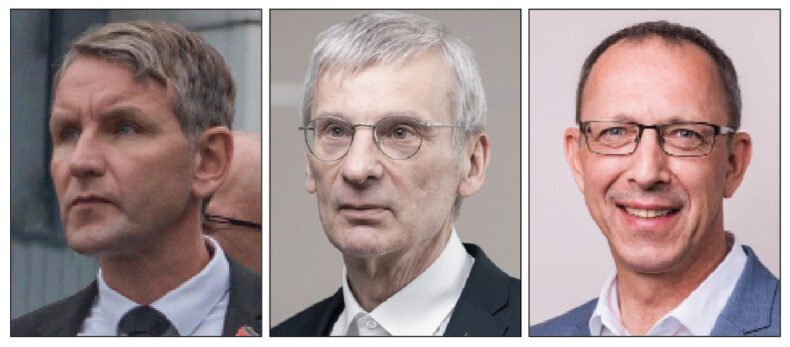
Dr Kat Williams and Dr Siobhan Hyland examine the ascendance of the German far right party in recent elections.
Voters in the eastern German states of Thuringia, Saxony, and Brandenburg went to the polls throughout September to cast their ballots in state elections, with the far-right Alternative for Germany (AfD) finishing first in Thuringia, and a close second in Saxony and Brandenburg.
Designated as right wing extremists
Trouncing the Christian Democrats (CDU) who have led the Thuringian state parliament since reunification in 1990, AfD won 32.8% of the vote. Its victory in Thuringia is significant, not only because this is the first time since the Second World War that a far-right party has finished first in a state election, but also because AfD is designated as a right-wing extremist group by the Federal Office for the Protection of the Constitution and is monitored by German intelligence services.
Furthermore, this year Thuringia’s controversial AfD leader Björn Höcke was convicted of using Nazi slogans at a political rally.
Since the 7 October 2023 Hamas attack on Israel, reports of anti-Semitic violence have increased in Germany, with graffiti painted on Jewish homes, arson attacks and assaults.
While Höcke has hailed the AfD’s success in Thuringia as a “historic victory”, it may prove extremely difficult for AfD to form a coalition government because none of the other parties are willing to work with it, including the newcomer Sahra Wagenknecht Alliance (BSW). The BSW appears to resonate with voters in the eastern German states because of its criticism of the federal German government and continued military support for Ukraine.
Coming third in all three state elections, the BSW will be a key potential coalition partner for the other parties, despite its pro-Kremlin stance. Germany’s electoral system of proportional representation means AfD will not be able to govern without the support of other parties. Attempts to form coalitions by the other parties without the AfD have, unsurprisingly, been decried by its deputy AfD leader Alice Weidel as “undemocratic”.
Public outrage
Led by Jörg Urban, AfD came a close second behind the CDU in Saxony with 30.6% of the vote. In practical terms, the CDU will take 41 of the 120 parliamentary seats in Saxony, and AfD 40.
AfD also came second in the Brandenburg election on 22 September behind the incumbent Social Democrats (SPD) who have led the state parliament since 1990, securing 29.2% of the vote to the SPD’s 30.9%. Former dentist Hans‑Christoph Berndt, AfD lead candidate in the Brandenburg elections has, like his counterpart in Thuringia, been labelled a right-wing extremist by the domestic intelligence services.
The run-up to the elections in Thuringia, Saxony and Brandenburg were dominated by public outrage over immigration following stabbings in the city of Solingen in North Rhine‑Westphalia. The suspect, a Syrian man who came to Germany as an asylum-seeker, is purported to have links to the Islamic State terrorist group. The stabbings took place during a festival of diversity to commemorate the city’s 650th anniversary, with three people killed and eight injured.
Crackdown
Following accusations from AfD and its prominent members such as Höcke – that the ruling coalition of the SPD, Free Democrats (FDP) and the Greens have ignored the alleged threat posed by asylum-seekers – Chancellor Olaf Scholz of the SPD vowed to crack down on “illegal” migration. Against this backdrop of enduring political partisanship, the German federal elections are due to take place in September 2025.
According to the DW news channel, since the 7 October 2023 Hamas attack on Israel, reports of anti-Semitic violence have increased in Germany, with graffiti painted on Jewish homes, arson attacks and assaults. The Central Welfare Board of Jews in Germany has set up a hotline providing advice on how to deal with anti-Semitic incidents.
Deportation
Martin Sellner, a leader in the Austrian Identitarian Movement, was deported to Germany from Switzerland in October, defying a ban imposed on him earlier in the year. He was also banned from entering Germany this year, a ruling that was later rescinded as unlawful.
He is a proponent of “remigration”, the expulsion from Austria of anyone without Austrian nationality who is considered “long-term unemployed” or living in a “parallel society”. He was previously under investigation for links to Brenton Tarrant, the white supremacist who in 2019 massacred 51 people in two mosques in Christchurch, New Zealand, although the investigation was dropped in 2021.
This article first appeared in the Autumn 2024 issue of Searchlight





